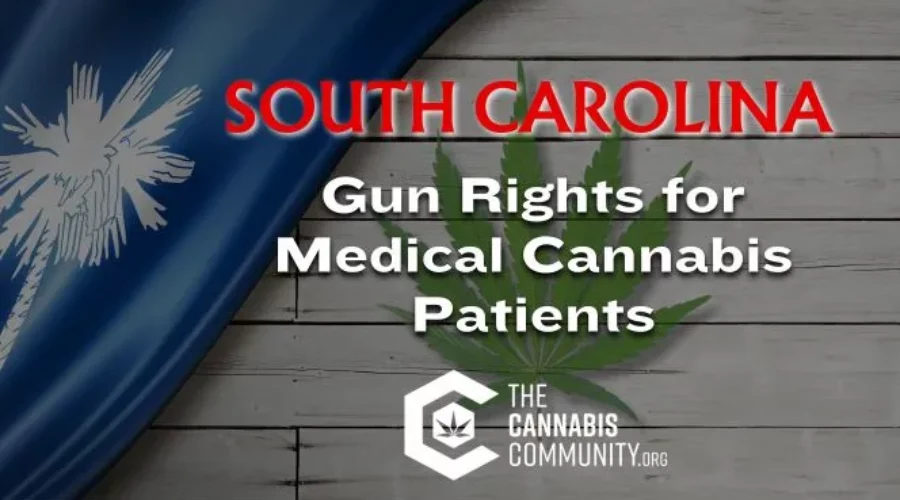South Carolina Gun Rights for Medical Cannabis Patients
Table of Contents
In 2014, South Carolina took its first step into the world of medical cannabis by enacting Julian’s Law (S 1035). This legislation allowed children with severe epilepsy to access CBD oil with specific cannabinoid ratios – at least 15% CBD and no more than 0.9% THC. CBD oil appeared to be particularly helpful in treating epilepsy symptoms, and this was a promising first step for patients and their families.
The year 2015 marked a significant milestone as the South Carolina House of Representatives introduced the Medical Marijuana Program Act, H. 407. This ambitious legislation aimed to establish a medical marijuana program within the state. However, it stalled in the Senate’s Medical Affairs Committee.
In a bid to find common ground and secure Senate support, lawmakers revisited the bill in 2017, renaming it the Compassionate Care Act. Despite this rebranding and hope for a breakthrough, the Act faced opposition on the Senate floor and did not become law.
2017 also witnessed the re-legalization of industrial hemp cultivation in alignment with the federal 2014 Farm Bill, enabling a limited number of cultivators to obtain state licenses. Industrial hemp — a close relative of cannabis — is prized for its low THC content and diverse industrial applications. Hemp-derived CBD oil and other products are now legal as per the guidelines outlined in the Farm Bill. However, there is a strict requirement that these products contain no more than 0.3% THC. Typically, full-spectrum CBD products may contain up to 0.3% THC, while broad-spectrum CBD products either contain minimal traces of THC or are entirely THC-free.
South Carolina strictly prohibits the sale and production of food products containing pure CBD (CBD isolates) and even full-spectrum hemp extracts labeled as CBD. To remain within legal boundaries, CBD oil must be labeled as “hemp oil.”
In December 2020, the South Carolina Compassionate Care Act (S.150/H.3361) began to take shape. This bill had bipartisan backing and was championed by Republican Representative Bill Herbkersman and Republican Senator Tom Davis. Fast forward to 2022, and this legislation became a focal point in the changing landscape of medical cannabis in South Carolina.
In March 2021, the Act gained momentum when it was advanced by the Senate Medical Affairs Committee. However, it faced setbacks during the legislative session, failing to secure a vote. Determined to press forward, the Senate majority leader scheduled it as a priority item for the 2022 session.
January 26, 2022 marked a historic moment as the Senate engaged in a vigorous debate on cannabis legalization for the first time in South Carolina. The Compassionate Care Act underwent seven days of intense scrutiny and survived an attempt to gut the bill. On February 9, 2022, the Act achieved a pivotal victory with a 28-15 vote in favor of a second reading in the Senate. The momentum persisted, and the bill ultimately passed the Senate on February 10, 2022.
These developments underscored the growing support for medical cannabis in South Carolina, providing hope for patients seeking access. As of late 2023, the conversation around medical cannabis continues, with bills like H 3226 and H 3486 (Compassionate Care Act) in the House of Representatives and H 3561 focused on cannabis decriminalization.
Does Having a Medical Cannabis Card (Low-THC Card) Mean Not Being Eligible for a Gun License in South Carolina?
In South Carolina, there is no formal medical marijuana program. However, CBD oil is permitted as long as it adheres to specific CBD/THC percentage limits. Patients who have written recommendations from their doctors can obtain CBD oil of at least 15% CBD and no more than 0.9% THC. This allowance is primarily intended to provide relief for severe epilepsy symptoms.
On the other hand, South Carolina gun law does not typically require a background check as part of the South Carolina Concealed Weapons Permit (CWP) application process. The eligibility criteria focus on factors such as age, successful completion of an approved firearms training course, and compliance with other state regulations.
To summarize, the use of CBD oil, which is legal in South Carolina as long as it adheres to specific THC percentage limits, is generally not a disqualifying factor for obtaining a CWP. CBD oil itself does not typically raise concerns related to background checks for CWP applicants.
Can You Take Your Gun to a Dispensary in South Carolina?
In South Carolina, there are no legal marijuana dispensaries, and marijuana remains classified as a Schedule I controlled substance at the federal level. Shipping marijuana across state lines is a federal offense. CBD products — including CBD oil — can be purchased in South Carolina from dispensaries, markets, and pharmacies. You do not need a prescription or a medical card to buy CBD from a dispensary.
As of August 15, 2021, open carry and concealed carry of firearms are legal for South Carolina residents with a valid CWP and for non-residents with a license/permit from a state recognized by South Carolina. A “concealable weapon” refers to a firearm less than 12 inches in length, which can be carried openly on one’s person or discreetly concealed, as long as it remains hidden from public view in typical clothing.
It’s crucial to note that areas where concealed carry is prohibited also restrict open carry. Private properties displaying signs indicating ‘No Concealable Weapons Allowed’ prohibit both open and concealed carry.
In conclusion, if you possess a valid South Carolina CWP, purchasing and carrying CBD oil should not pose a problem, as long as you adhere to the relevant firearm laws and regulations in the state.
Can You Consume CBD and Own a Gun in South Carolina?
It is generally legal to consume CBD oil and own a gun in South Carolina. It is crucial to keep in mind that residents of South Carolina must adhere to tight THC percentage restrictions and firearms laws in order to exercise their right to own and carry firearms, as well as their right to consume CBD oil.
Can I Own a Gun if My Spouse Has A Medical Cannabis Card in South Carolina?
South Carolina does not have a medical marijuana program, and medical cannabis cards are not required in the state for access to CBD oil. South Carolina’s firearm ownership laws typically do not disqualify individuals based on their spouse’s medical status. However, it’s crucial to ensure compliance with all relevant state and federal firearm regulations and consult legal experts for personalized guidance.
Can I Own a Gun if I Have an Expired Medical Card?
There are no medical cannabis cards or medical cannabis program in the state of South Carolina. CBD oil is legal and consumable by the general public, with a few restrictions.
Can You Own a Gun if You Work at a Dispensary?
You can theoretically own a gun in South Carolina if you work at a dispensary, but there are specific conditions to consider. If you are an employee of a dispensary, you may do so ONLY IF you have a concealed weapons permit AND you have the permission of the owner. You must also ensure that you are not restricted from owning a gun by South Carolina’s firearm laws.
Get Your Medical Cannabis Card Online and in Minutes
Back to Directory




Pingback: Will South Carolina Legalize Marijuana in 2024? - Greenville Daily Bugle